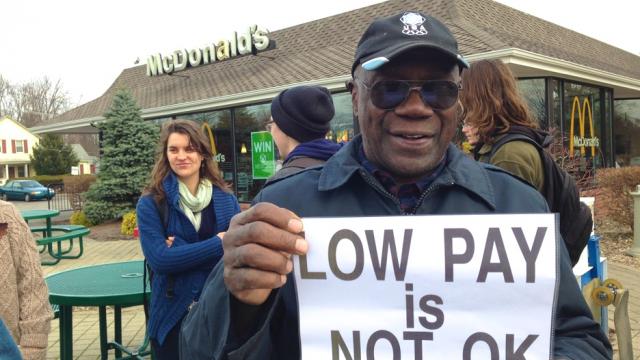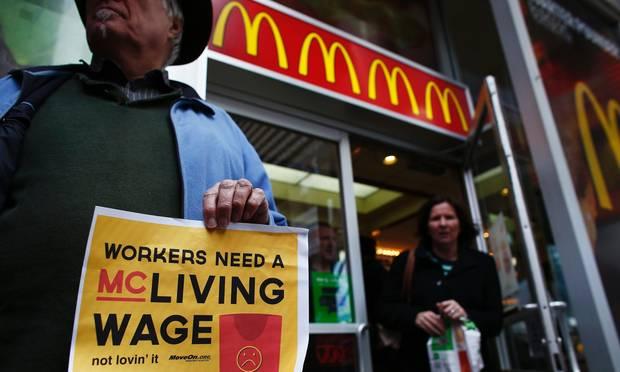
Thousands of fast food and retail workers went on strike across the US on Thursday in a signal of the growing clamor for action on income equality.
In Chicago, hundreds of protesters gathered outside a McDonalds at 6.15am. As a large "Christmas Grinch" ambled about in freezing temperatures, demonstrators chanted for the minimum wage to be increased to $15 per hour.
It was the first of nine strikes in Chicago, with employees at McDonalds, Wendy's, Walgreens, Macy's and Sears also due to walk off shift. Low wage workers were due to strike across 100 cities through the day, including Boston, Detroit, New York City, Oakland, Los Angeles and St Louis.
"To put it in perspective, yesterday I got paid, today I have not a dollar in my pocket," said Akilarose Thompson, 24. She was on strike from the McDonalds in Chicago's West Town – the scene of Thursday morning's protest that kicked off actions around the city.
Thompson has worked at McDonalds for almost a year, serving customers on the cash register or on the drive-thru window. She got a pay rise in June and now earns $8.28 an hour – three cents above Illinois's minimum wage of $8.25. Thompson works a second job too, at Red Lobster, but still has to go to food banks to support her and her 15-month-old daughter.
"Sometimes two or three a month. Lots of times you can only go to the same one once a month, so I find different ones to go to. I have to in order to put food on the table," she said.
"It is so depressing. You put a smile on because you're in customer service and you have to. But on the inside it really breaks you down when you're always at work but you're always broke."
She is not alone. The Greater Chicago food depository, which donates food through banks, pantries and soup kitchens, says it helps 678,000 adults and children in the Chicago metropolitan area every year.
The hardest thing, Thompson said, is the compromises she is forced to make because she does not earn enough money. She lives in West Humboldt Park, an area blighted by drug dealing. She worries about not being able to provide for her daughter.
"It's the Christmas holiday, and I can't buy presents. I actually had to choose between buying my baby a coat and starting her Christmas shopping. That's my biggest thing right now – I'm afraid I won't be able to provide her her first proper Christmas because I have so many checks coming."
The nationwide walkouts come as momentum appears to be gathering for action on increasing the federal minimum wage. On Wednesday, President Barack Obama gave a landmark speech on income equality, which he said was "the defining challenge of our time", while in November thousands of Walmart workers walked off the job in the latest of a series of protests against low pay and poor conditions.
The federal minimum wage – which many fast food and retail outlets pay employees – is $7.25, or about $15,000 a year for full-time work. That rate was set in a 2009 measure that increased the minimum wage but still left it, in real terms, at the same rate as when Harry Truman was in office – a fact Obama mentioned in his speech on Wednesday.
The rate is actually higher in Chicago, as Illinois has set its own minimum rate of $8.25 per hour. But protesters say it is still far too low. Backed by unions such as the SEIU nationally and smaller coalitions in different cities – in Chicago, the Fight for 15 campaign has been put together by the Workers Organizing Committee of Chicago, made up of a series of smaller action groups such as Arise Chicago and Lakeview Action Coalition – campaigners are calling for the federal rate to be increased to $15 per hour.
"It would be life changing," Thompson said on Thursday, as the 200 or so protesters circled the McDonalds parking lot, the Grinch bobbing around outside the drive-thru window.
"I would be able to move and that is my sole thing right now. I have to get my daughter into a better neighborhood. I have to.
"So if I was able to afford that then I could walk with my head held high. No more crying at night. Because you can't cry in front of the kids because they'll know something is wrong."
At 9.45am around 200 protesters had gathered outside a Walgreens in downtown Chicago. "We can't survive on eight-twenty-five," the crowd chanted as it approached the store, before segueing into: "Walgreens, Walgreens, you can't hide. We can see your greedy side."
Dejaun Jackson, 23, has worked at Walgreens for two years and was on strike on Thursday. He actually earns $10.49 an hour – above the proposed Senate measure – but says it is not enough to survive on.
As the crowd moved further south down Chicago's State Street, stopping outside Sears at 10.30am and Wendy's at 11.30am in a carefully orchestrated display of dissatisfaction, Jackson explained that his main hope in earning more money was to move his two children, aged six and four, to a better neighborhood, following a sobering incident last year outside his home in Chicago's West Side.
"It was last summer but I remember it like it was yesterday," he said. "It was about 2pm, 2.10pm in the afternoon, the kids were outside playing and we were just standing on the stairs. A black car pulled up at the intersection and just let rounds go.
"They were shooting at a rival gang and just let rounds go. The kids were just screaming, so we're running out grabbing the kids and bringing them back in the house and after that, that just lets me know where I'm at.
"All I want to be able to do is for my kids to be able to go in the front yard and just go play. They can't even play outside."
In New York state, where the nation's largest metro region, New York City, is home to 55,000 fast food workers, the minimum wage is at the federal rate of $7.25. A series of strikes were due to take place there on Thursday.
Obama called for the federal rate to be increased in his speech on Wednesday, specifically mentioning fast food and retail workers in a demonstration of the impact demonstrations are beginning to have.
"I’m going to keep pushing until we get a higher minimum wage for hardworking Americans across the entire country. It will be good for our economy. It will be good for our families," Obama said.
The president has suggested he would back a Senate measure to increase the minimum wage to $10.10, although Republicans oppose the initiative. Obama had previously called for the wage to be increased in his State of the Union address in February. Critics say little progress has been made since then.
For Thompson and her colleagues, change cannot come soon enough. Thompson had been studying homeopathy at college with the hope of a career in natural medicine. She had to put that on hold when she took her second job.
"I was in the process of getting all my pre-reqs done and then I had to take off a semester. Unfortunately one semester turned into two. But I do intend on going back to school."
Jessica Davis, 25, works with Thompson. Davis is a crew trainer, meaning she trains new employees. She has worked for McDonalds for four years and earns $8.88 an hour.
Like Thompson, she has had to put her job before her education. She was studying for a degree in sociology and would like to work in a juvenile detention center with at-risk youth, but is unable to earn enough money to finish her studies.
"I had to put that on hold. I owed them some money so I can't register for classes. The money I'm making here I'm not able to pay them back. With two small children emergencies happen. Just last month my daughter was sick so I had to miss a day of work. That day showed up big time in my pay check."
Davis said she sometimes struggles to pay her bills and worries about caring for her two daughters, aged four and four months. Her parents help sometimes – other times she skips the bills and risks getting into debt.
"They say this is supposed to be a starter job but really we don't have any other jobs to go to. There's nothing else out there," Davis said. "We're just tired of making multi-million dollars for this company and at the end of the day we have nothing to show for it."
Davis said a higher minimum wage would enable her to change her life.
"I would have more money for my children. And I would have money to go back to school with,” she said. “We would be able to float. And right now we're sinking."
Originally published by The Guardian
3 WAYS TO SHOW YOUR SUPPORT
- Log in to post comments

















